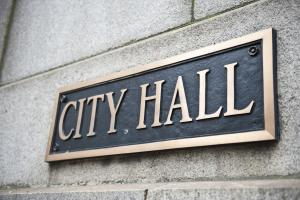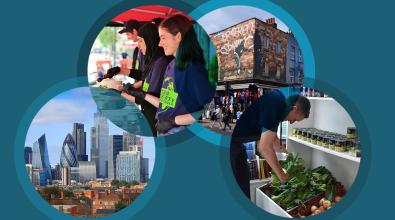6 tips for America’s new mayors

Dozens of American cities, from Atlanta to New York to Seattle to Topeka, are welcoming a new mayor to city hall this week. They arrive at a moment of unprecedented challenges—and big opportunities.
In many ways, the job of being mayor has never been harder. Today’s mayors face a pandemic that won’t quit, a surge in gun crimes, ailing downtowns, a mental health crisis, and record drug overdoses.
At the same time, mayors are situated better than ever to pursue truly transformative changes. For the first time in recent memory, cities are awash in flexible federal dollars they can use to make major headway on challenges like homelessness, carbon emissions, the digital divide, and more. Mayors, perhaps more than anybody else, are in a position to make concrete progress on racial justice, equity, and police reform in ways residents can feel. And poll after poll shows the public trusts them more than leaders at other levels of government to get stuff done.
There’s no doubt that our newest mayors understand the depth of the challenges ahead. In fact, it’s precisely because the needs now in their communities are so great that most of them ran for mayor in the first place. As a group, they are excited for the work ahead and hungry to make an impact.
As they settle in, here are six tips—pulling on standout examples of other great mayors and the work of organizations that are here to uplift cities and city leaders.
1. Build your team first. This is always the top advice from Mike Bloomberg, the 108th mayor of New York City and founder of Bloomberg LP and Bloomberg Philanthropies. Hire people who are smart, represent a diversity of perspectives, and are willing to disagree with you, he says—and then empower them to do their jobs. Good mayors recognize that running a city is a team sport, not an individual one. Developing a group of trusted, competent leaders—and then giving them the latitude to take charge—is the first and most essential task.
2. Prepare to collaborate. Today, nothing big happens by government acting alone. That’s important to remember in a moment when Washington is writing cities big checks. Mayor Steve Adler of Austin, Texas, took the bulk of his city’s federal aid and leveraged it with other public and private dollars to tackle homelessness at a new scale of ambition in his community. Forming, maintaining, and sustaining partnerships is tough work. One absolutely necessary ingredient: a vocal mayoral commitment to, and insistence on, collaboration.
3. Get smart on innovation. Over the past few years, there’s been a dramatic increase in the number of innovation teams and offices in city halls around the world. And, at the same time, mayors are taking more steps to create cultures that are receptive to new ideas from citizens, front-line staff, and entrepreneurs. The good news is that best practices are becoming widespread, which means new mayors don’t need to reinvent the wheel. The new Bloomberg Center for Public Innovation at Johns Hopkins University will be a great resource for you here.
4. Harness data and digital. Some new mayors may be shocked to find their city halls running essentially as analog organizations. Internally, they may find aging data systems and some records still kept on paper. Externally, digital services—where they exist—are likely to be stuck at 1.0 versions that feel clunky compared with the slick apps we are all now accustomed to.
Mayors need not be technologists themselves to make government’s use of it a top priority. As James Anderson of Bloomberg Philanthropies wrote recently, this work starts with a mayor setting a clear expectation that every resident is entitled to great digital public services. Then, it’s a matter of waking bureaucracies out of their slumber. New mayors, Anderson says, “should focus on pushing digital and tech responsibilities into the agencies themselves, by appointing commissioners who share an appreciation of the leap-frog service enhancements technology can fuel and then build necessary skills within those agencies.”
5. Ask “why?” Harvard Professor David Eaves likes to say that asking the right questions is one of a leader’s most essential tools. When agency heads say they’re staying the course, despite unimpressive results, ask why. When the city lawyer says, “that’s not the way things are done,” ask why. Too often in government, we maintain the status quo because nothing’s gone terribly wrong—not because anything’s gone especially right. Even when we think we aren’t allowed to change course, upon re-examination, we see that change was possible all along.
6. Plug in. Being mayor can be lonely: No one else in the city holds a job anything like it. It’s critical for mayors to connect with their peers across the country, and even around the world. Those connections don’t just help when the job gets difficult. They also open doors to new ideas and collective action that amplify the impact mayors can have as a leader. A number of organizations and initiatives have emerged in recent years to connect city leaders with the best tools, techniques, and thinking to solve problems. Start by checking out Results for America, the Bloomberg Harvard City Leadership Initiative, Code for America, GovEx at Johns Hopkins University, the Behavioural Insights Team, the Mayors Innovation Project, Living Cities, and Cities of Service.
Our country’s renewal and greatness begins in our communities, the true laboratories of democracy. And that’s why our mayors have got to think big, be smart, and take risks. Your only real failure will be for a lack of trying.

